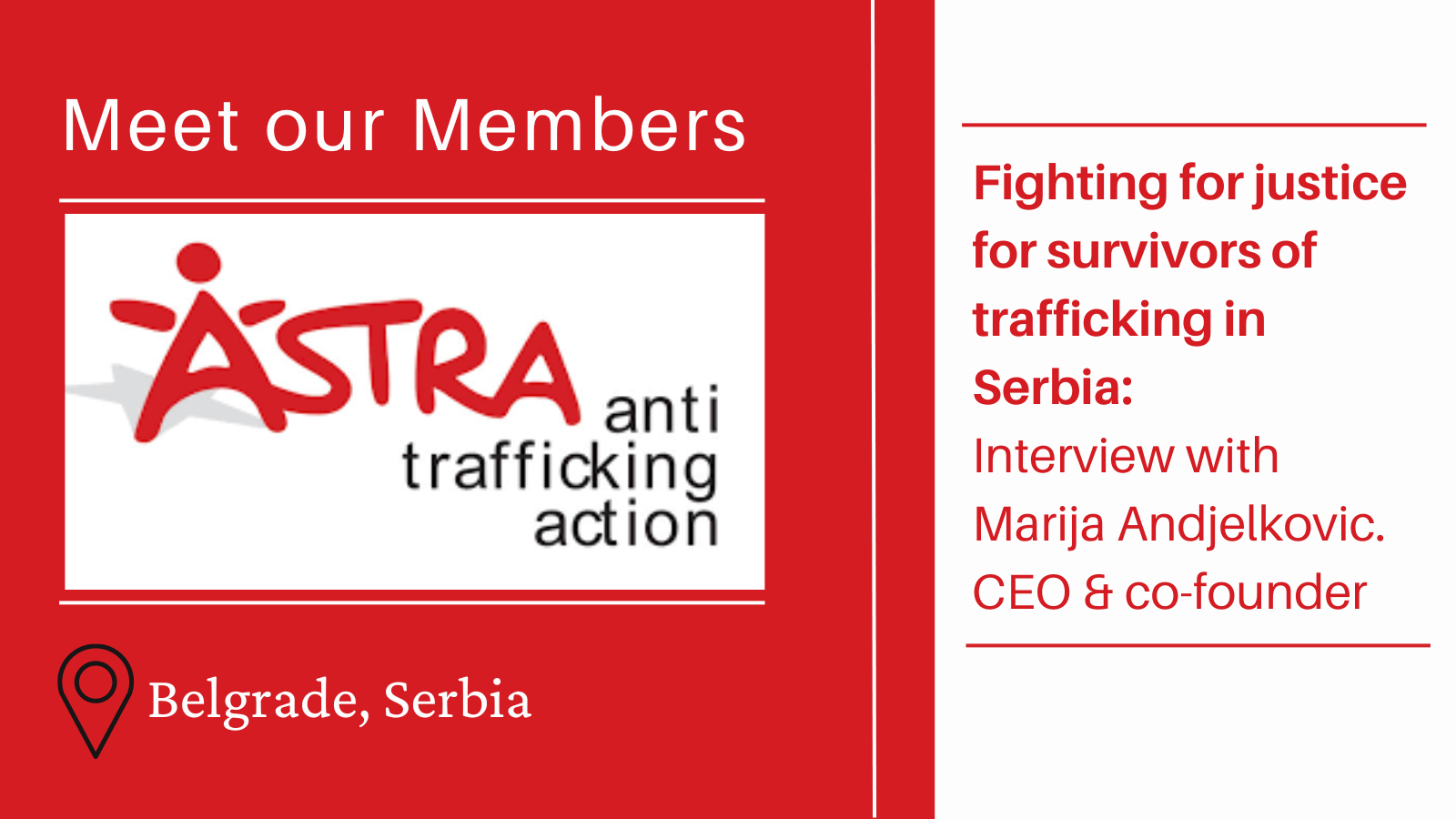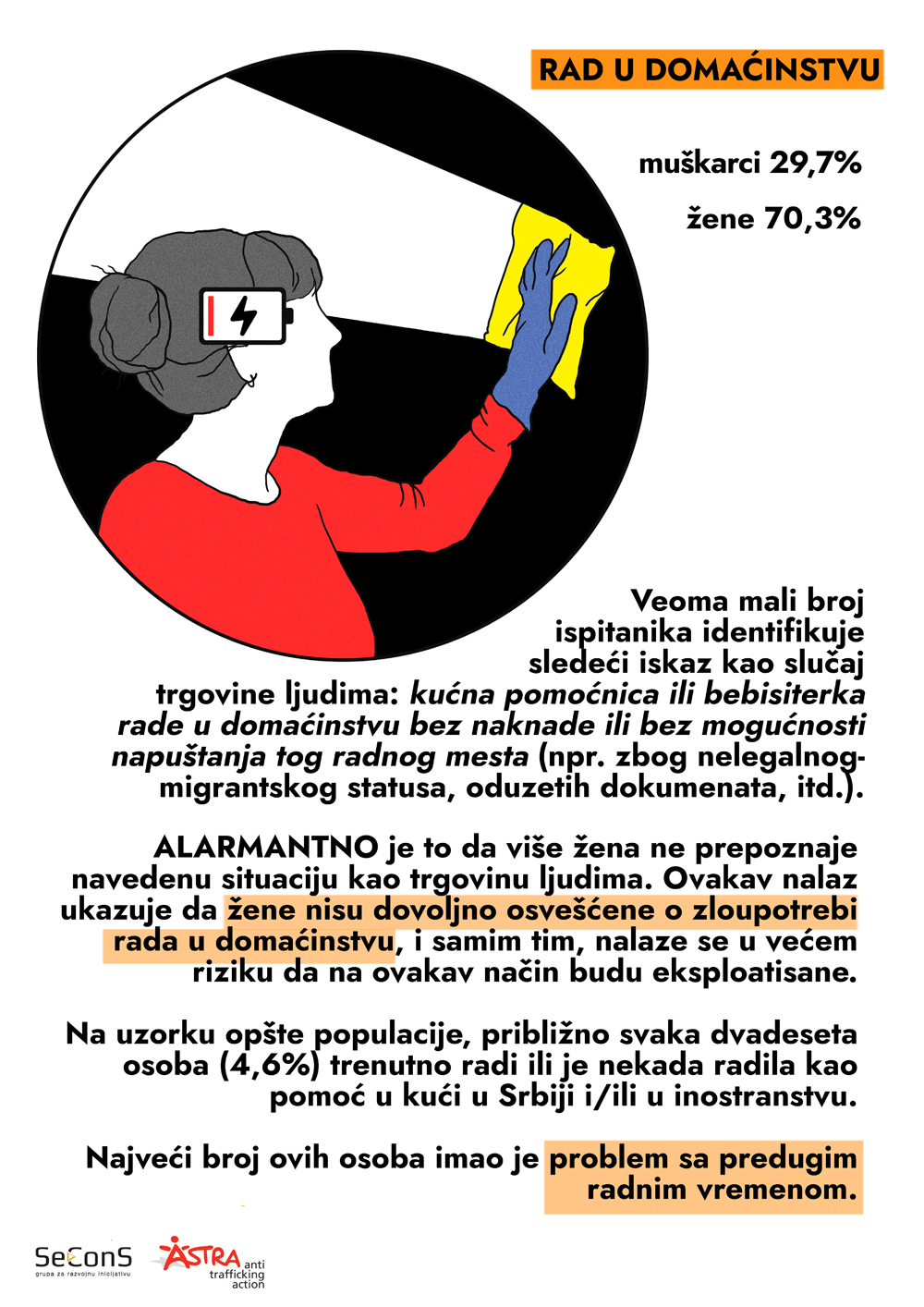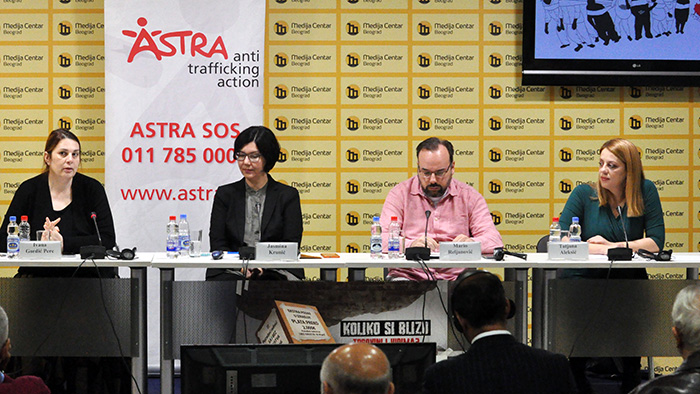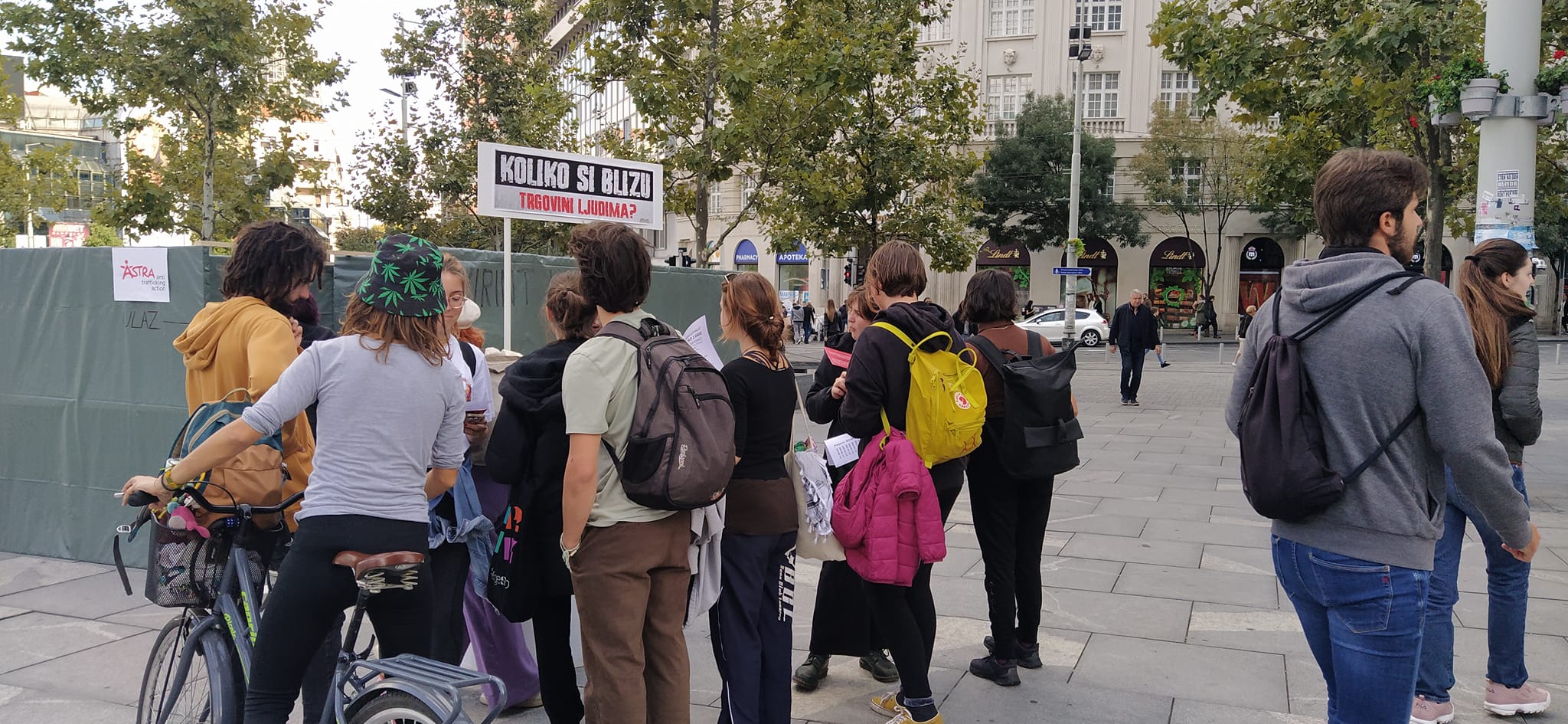Meet Our Members: ASTRA Anti-Trafficking Action

ASTRA - Anti-Trafficking Action is a member of GAATW in Serbia. In September 2022, Jennifer Janssen from the GAATW Secretariat conducted this interview with Marija Andjelkovic, President of ASTRA, to better understand the organisation’s history, current work, and context.
Jennifer Janssen: Thank you for meeting with me today. Please tell me a bit about yourself and ASTRA – how and when it was founded and the motives of its beginning?
Marija Andjelkovic: Thank you for this opportunity to share more about our work. My name is Maria Andjelkovic, I'm the director of ASTRA and one of the founders. ASTRA is a local anti-trafficking NGO in Serbia but connected with other NGOs and anti-trafficking movements all over the world.
ASTRA was founded in 2000 by 10 young activists coming from different backgrounds, but most of us were active in the movements against the dictatorship during the 1990s. When we started ASTRA, our first idea was to work on trafficking prevention education, so we started a large-scale media campaign on trafficking called Open Your Eyes. We also started our first info line informing people about safe migration, trafficking and so on. But then in 2002 we received the first call from a victim of trafficking and we realised that there is actually no service that we could refer victims to and in that moment we decided to start the Direct Victim Assistance Programme, which is today one of our largest programmes. We also decided to transform the info line into an SOS hotline for victims of trafficking and their families. So until now, we received 54,500 calls from 6,600 clients through that hotline, and we’ve identified 575 victims of trafficking who needed help and we provided support to them. Since 2012, we’ve also been running the European number 116000 for missing children in Serbia.
ASTRA provides direct assistance to victims; medical, legal, psychological assistance, alternative accommodation if needed, and support during the reintegration process. Being in direct contact with the victims, with people who’ve survived trafficking, and being on a local level in the field we have gained a lot of knowledge. So we also started the education programme, primarily education for professionals, such as teachers and professors. Then we did trainings for the police, social welfare centres, journalists, psychotherapists, doctors, lawyers, prosecutors, judges, labour inspectors, trade unions, and I think there is no profession right now in Serbia which hasn’t been covered by our training and education programme.
Today, we have a network of 30 lawyers who are educated to provide assistance to trafficked persons (and of course sensitised for this issue) and also a network of 25 therapists all over Serbia who can provide psychotherapy and psychological support to victims of trafficking. Very early we realised that we are dealing with organised crime, so we started to build our network. First among NGOs, we started an anti-trafficking network of 10 NGOs dealing with different issues: specialised in violence against women, women’s rights, children rights, human rights in general, and so on. We educate them on trafficking and how to work with victims, but they mostly choose to work on prevention, which is very important at the local level, because a lot of traffickers are from smaller towns. So if they reach a victim, they refer her or him to ASTRA. We are also part of La Strada International NGO Platform and GAATW.
It's really important for us to be part of these networks. Thanks to them, we are able to provide assistance very fast, but also to build our capacities, learn from other experiences on trends and how to handle certain situations. One of ASTRA’s regular activities is monitoring and reporting on the trafficking situation in Serbia to UN committees, Trafficking in Persons reports, schedule reports, and EU progress reports – we use all these mechanisms to advocate for victims’ rights. Sometimes we conduct research, especially if we notice new trends in the field that need to be understood better.
 |
From ASTRA’s recent comprehensive survey on Human Trafficking in Serbia released in December 2022 |
From the very beginning we were part of a national referral mechanism that started to be built in 2002 – we contributed to development of the national anti-trafficking strategy, Action Plan, Standard Operating Procedures, and so on. And we have signed a Memorandum of Understanding with all relevant institutions in Serbia. ASTRA is known as a very critical organisation, and we don’t negotiate the minimum standards that we want to see for clients. But of course, we cooperate with institutions especially in building these mechanisms, so for a very long time we’ve been advocating, for example, for introducing the Fund for Victims of Violent Criminal Acts Compensation Fund or for a national rapporteur on trafficking. Finally, the national rapporteur was introduced last year and we’re very proud of that.
JJ: You’ve been in this field for so long, what are some recent trends that you’ve noticed?
MA: Trends have changed several times. In 2000, most of our clients were not Serbian citizens but coming from other countries – Moldova, Bulgaria, Romania, Ukraine – passing through Serbia and going to Western Europe, mostly Italy, Spain, Germany, Sweden… We also had clients who ended up in the Middle East. Both then and now, most are women and girls. Now we see more internal trafficking – selling women and girls from one town in Serbia to another. We also notice changes in traffickers’ modus operandi: before, we used to see more bruises, cigarette burns, broken teeth, and so on. We still see that, but somehow traffickers have become more sophisticated because of the new technologies and because they use more psychological control, they blackmail victims. So it's much harder to prove some of these things when we go with our clients to court, for example; it's much harder to explain to professionals why she couldn't escape, why she doesn't have bruises, why she was not beaten, and so on.
We also have more migrant workers now coming to Serbia. And because the government is not putting minimum standards for migrant workers, we also have a lot of cases of labour exploitation. The first one happened in 2006, it was a Serbian engineer who was trafficked to Malta and exploited on a construction site there. Since then, we’ve had several massive cases of labour exploitation; the most recent one was the so-called LingLong case, with exploitation of Vietnamese workers brought by a Chinese company to build a factory that would sell tyres to companies in Western Europe.
JJ: What are the main challenges that trafficked persons face in Serbia?
MA: The treatment from the institutions and non-implementation of the laws that are in place. We also have a huge issue with identification of victims – we have indicators, but they’re not adopted officially and still not public. The good thing is that the system of identification comes under the social welfare system and identification of the criminal act as in the Criminal Procedure, judiciary, and police. This separation is good, but in practice, victims are taken to the police and identified or not identified by the centre for victims and there is no opportunity for them to protest the decision.
Another challenge is the lack of services, as most services are provided by just two or three NGOs. For a long time, we didn't have a shelter for trafficked persons – just one NGO shelter with several beds. And reintegration programmes almost don't exist, so trafficked persons are on their own. Safety issues and risk assessment are at a very low level and victims may be threatened and intimidated even in the courtroom. One of the weakest things is the judiciary. ASTRA monitors court cases on trafficking for the past 11 years. And every year we have fewer and fewer convictions for trafficking and more for similar criminal acts like facilitation of prostitution, which is a misdemeanour. The prosecution re-qualifies the crime to facilitation of prostitution and enters a plea agreement with the trafficker so that he or she receives a very small penalty – a fine or a suspended sentence – and the victim is not even informed about it and can’t demand compensation. The compensation issue is definitely one of the things that is lacking in Serbia, which is why we’ve been lobbying for so long for this compensation fund for victims. The criminal court judge can decide to award compensation during the criminal procedure, but they don’t do it; they send the case and trafficked persons to ask for compensation in the civil procedure, which is long and expensive, and she has to face her trafficker again. Out of the 570 victims that we’ve supported only three have been awarded compensation by the court, and only one managed to actually receive it.
Besides, the average sentence for trafficking in Serbia is three to five years, according to the judgments that we have collected. But three to five years of jail time is very low. Also, protection of the victims during the court procedure is very weak. Some victims get the status of specially vulnerable witness, but in practice they’re still not protected fully – they can’t testify through the video link, in a separate room and so on. Very often victims face traffickers in the courtroom, they don’t receive legal support, they’re threatened before and during the trial. This is something that we need to work more on.
JJ: How do you incorporate the voices and experiences of trafficked persons in your work?
MA: The wellbeing of our clients always comes first and whether they are directly or indirectly involved, we always take their opinions into consideration. We are happy to see that nowadays more and more survivors are feeling the strength to be in the public spotlight, to contribute to policies, and to implement anti-trafficking activities.
We recently had a project in which we decided to involve clients directly in the activities. It was a research on the trafficking situation in Serbia, mainly about analysing statistics, but it was the first time that we involved survivors as researchers, giving input, and creating this project from the very beginning. One output of the project was to build an app to provide information to people from Serbia who plan to find work abroad. Survivors provided input based on their own experience for the research and for building the app. It was really impressive what good comments they gave and some of these comments have now become an integral part of the research and the app.
But in general, it's really important to listen to our clients not only at the beginning, but throughout the whole process of recovery and reintegration. Because like all other people, they also have other issues in their life; trafficking is not the only thing that has happened to them. For example, during the implementation of this project, some clients mentioned that they didn’t have time, they didn't feel strong enough in that moment because they were dealing with other issues and asked if they could do it in one or two months. So it's really important to follow their lead. And for other clients that we thought were in a really difficult situation, being part of this project was a kind of therapy for them, they provided such valuable comments that the researchers who were involved in the writing process were so interested about the insights that our clients provided. So I think it's really important to include trafficked persons in everything that we do, and in the policies that we are developing, not only on the NGO level, but also on a governmental level. It is also important to find a way to do it, to follow their wishes, and their current situation.
 |
On European Day against Human Trafficking, October 18, ASTRA presented its report on human trafficking for the purpose of labour exploitation of workers from Vietnam engaged in the construction of the Linglong tire factory |
JJ: What would you say is unique about ASTRA?
MA: Our approach is perhaps not unique, as I know that some of our colleagues worldwide also use this approach, but we focus on the use of an individual approach for each client. We are not obsessed with the numbers or statistics because we know that statistics can be tricky. For example, I remember when we had an increased number of children victims of trafficking. The year before, there was a lot of training for police and social welfare centres to work with children victims of trafficking. So that had an impact - that finally our government and institutions admitted that trafficking of children happens in Serbia as well - and that could be one of the reasons why we have this increased number of trafficked children being reported in that year. This is why it is important to have this individual approach to each person - to follow their needs and not to just implement a project as ‘copy paste’. I remember when we suggested a project to one of our donors, he mentioned how this idea did not work in Cambodia and therefore wasn't going to work in Serbia. I really think that we should look into the individual and local surroundings, as well as each situation and trends, to work with the survivors with the understanding that each of them is unique. This is something that we always do: we put above all else the survivors we work with, because our activities are created, shaped, and formed depending on what we see in the field. This is the principle that we have followed all these 22 years.
JJ: You are doing admirable work. Could you share with me one failure and one success of ASTRA?
MA: It may sound corny, but our successes are definitely related to the success of our clients. When we see that someone has succeeded - not only to get out of the trafficking situation and be psychologically stable, but also to continue with their life, independent of their family, NGOs, the government, or institutions, but be on their own and to call us after several years and say that she or he is doing fine. This is something really important for us.
In terms of failures- when we do a search for our clients, because we also search for missing persons, if that search ends up unfortunately in a bad way, that's something that we feel as our failure. Even if it’s not directly related to our work, we give our best and when we fail, it makes us feel really bad.
Two things happened last year that I would like to share. The first is the judgement of the European Court for Human Rights for the Azerbaijan case versus the Serbian case. It's a case that we used to work a lot on, supporting people who ended up as slaves on construction sites in Azerbaijan.
The second is the decision of the Constitutional Court of Serbia, it's the first one on trafficking. And it's related to our client - child victim of trafficking, who was sexually exploited and who showed up 27 times in the courtroom while her traffickers showed up only 10 times. She was strong enough to come every time, ready to testify what happened to her. And after seven years of trial, the prosecutor decided to do a re-qualification of the criminal act to facilitation of prostitution, and to do a plea bargain with the trafficker. So we decided to go to the Constitutional Court, they made this unique decision saying that this child was first trafficked by a trafficker and then by the system. These Institutes have re-qualification and plea bargains to make the process shorter and cheaper, but in this concrete case, the court couldn't understand how it's cheaper and shorter after seven years of molesting this child through the system. For the first time, the Constitutional Court awarded a huge compensation for this child, now a young woman. The Constitutional Court concluded by saying there is no money that could possibly change how her life was destroyed by the acts of institutions, but at least this is some compensation for her moral damages. The moment when we told her about the court’s decision she told us ‘Are you aware of how important this is for all other girls and children who are going through what I have gone through!’ This gives us a reason to continue doing this job.
 |
Display of "Human Trafficking Labyrinth" to educate youth about ways to recognize, prevent and assist in cases of human trafficking for work exploitation in September 2022 |
JJ: Thank you for sharing that. Last question, what does the ASTRA mean?
MA: When we started, ASTRA meant Anti Sex-Trafficking Action. Then we removed Sex from our name, so it’s Anti-Trafficking Action, because we are dealing with all types of trafficking - sexual exploitation, labour exploitation, domestic work and so on. And we work with women, children and men, so we have clients from everywhere and we deal with all types of anti-trafficking action.
JJ: I have no more questions, is there anything else you would like to add that I did not ask about?
MA: No, that's everything.
JJ: Thank you so much for your time, it was a pleasure meeting you and getting to know more about ASTRA.

